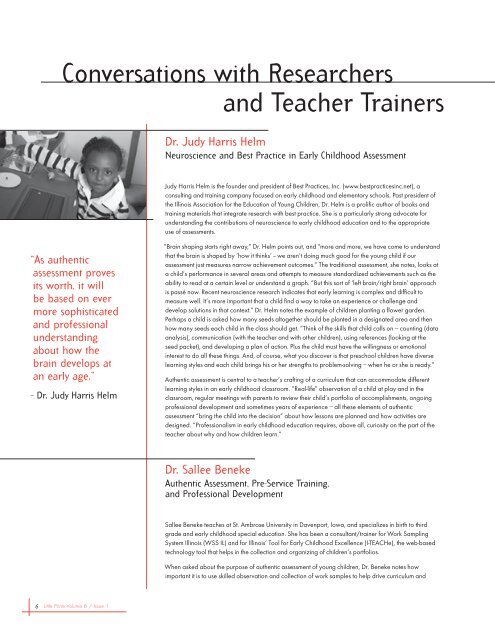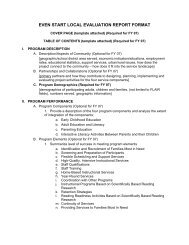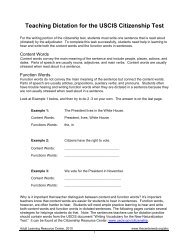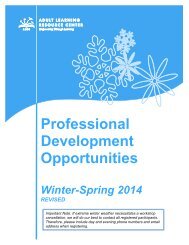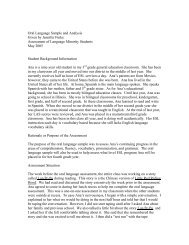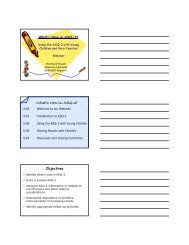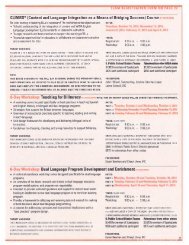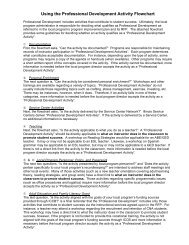Authentic Assessment and Early Childhood Educationâ an Update ...
Authentic Assessment and Early Childhood Educationâ an Update ...
Authentic Assessment and Early Childhood Educationâ an Update ...
Create successful ePaper yourself
Turn your PDF publications into a flip-book with our unique Google optimized e-Paper software.
Conversations with Researchers<br />
<strong><strong>an</strong>d</strong> Teacher Trainers<br />
Dr. Judy Harris Helm<br />
Neuroscience <strong><strong>an</strong>d</strong> Best Practice in <strong>Early</strong> <strong>Childhood</strong> <strong>Assessment</strong><br />
Judy Harris Helm is the founder <strong><strong>an</strong>d</strong> president of Best Practices, Inc. (www.bestpracticesinc.net), a<br />
consulting <strong><strong>an</strong>d</strong> training comp<strong>an</strong>y focused on early childhood <strong><strong>an</strong>d</strong> elementary schools. Past president of<br />
the Illinois Association for the Education of Young Children, Dr. Helm is a prolific author of books <strong><strong>an</strong>d</strong><br />
training materials that integrate research with best practice. She is a particularly strong advocate for<br />
underst<strong><strong>an</strong>d</strong>ing the contributions of neuroscience to early childhood education <strong><strong>an</strong>d</strong> to the appropriate<br />
use of assessments.<br />
“As authentic<br />
assessment proves<br />
its worth, it will<br />
be based on ever<br />
more sophisticated<br />
<strong><strong>an</strong>d</strong> professional<br />
underst<strong><strong>an</strong>d</strong>ing<br />
about how the<br />
brain develops at<br />
<strong>an</strong> early age.”<br />
– Dr. Judy Harris Helm<br />
“Brain shaping starts right away,” Dr. Helm points out, <strong><strong>an</strong>d</strong> “more <strong><strong>an</strong>d</strong> more, we have come to underst<strong><strong>an</strong>d</strong><br />
that the brain is shaped by ‘how it thinks’ -- we aren’t doing much good for the young child if our<br />
assessment just measures narrow achievement outcomes.” The traditional assessment, she notes, looks at<br />
a child’s perform<strong>an</strong>ce in several areas <strong><strong>an</strong>d</strong> attempts to measure st<strong><strong>an</strong>d</strong>ardized achievements such as the<br />
ability to read at a certain level or underst<strong><strong>an</strong>d</strong> a graph. “But this sort of ‘left brain/right brain’ approach<br />
is passé now. Recent neuroscience research indicates that early learning is complex <strong><strong>an</strong>d</strong> difficult to<br />
measure well. It’s more import<strong>an</strong>t that a child find a way to take <strong>an</strong> experience or challenge <strong><strong>an</strong>d</strong><br />
develop solutions in that context.” Dr. Helm notes the example of children pl<strong>an</strong>ting a flower garden.<br />
Perhaps a child is asked how m<strong>an</strong>y seeds altogether should be pl<strong>an</strong>ted in a designated area <strong><strong>an</strong>d</strong> then<br />
how m<strong>an</strong>y seeds each child in the class should get. “Think of the skills that child calls on – counting (data<br />
<strong>an</strong>alysis), communication (with the teacher <strong><strong>an</strong>d</strong> with other children), using references (looking at the<br />
seed packet), <strong><strong>an</strong>d</strong> developing a pl<strong>an</strong> of action. Plus the child must have the willingness or emotional<br />
interest to do all these things. And, of course, what you discover is that preschool children have diverse<br />
learning styles <strong><strong>an</strong>d</strong> each child brings his or her strengths to problem-solving – when he or she is ready.”<br />
<strong>Authentic</strong> assessment is central to a teacher’s crafting of a curriculum that c<strong>an</strong> accommodate different<br />
learning styles in <strong>an</strong> early childhood classroom. “Real-life” observation of a child at play <strong><strong>an</strong>d</strong> in the<br />
classroom, regular meetings with parents to review their child’s portfolio of accomplishments, ongoing<br />
professional development <strong><strong>an</strong>d</strong> sometimes years of experience – all these elements of authentic<br />
assessment “bring the child into the decision” about how lessons are pl<strong>an</strong>ned <strong><strong>an</strong>d</strong> how activities are<br />
designed. “Professionalism in early childhood education requires, above all, curiosity on the part of the<br />
teacher about why <strong><strong>an</strong>d</strong> how children learn.”<br />
Dr. Sallee Beneke<br />
<strong>Authentic</strong> <strong>Assessment</strong>, Pre-Service Training,<br />
<strong><strong>an</strong>d</strong> Professional Development<br />
Sallee Beneke teaches at St. Ambrose University in Davenport, Iowa, <strong><strong>an</strong>d</strong> specializes in birth to third<br />
grade <strong><strong>an</strong>d</strong> early childhood special education. She has been a consult<strong>an</strong>t/trainer for Work Sampling<br />
System Illinois (WSS IL) <strong><strong>an</strong>d</strong> for Illinois’ Tool for <strong>Early</strong> <strong>Childhood</strong> Excellence (I-TEACHe), the web-based<br />
technology tool that helps in the collection <strong><strong>an</strong>d</strong> org<strong>an</strong>izing of children’s portfolios.<br />
When asked about the purpose of authentic assessment of young children, Dr. Beneke notes how<br />
import<strong>an</strong>t it is to use skilled observation <strong><strong>an</strong>d</strong> collection of work samples to help drive curriculum <strong><strong>an</strong>d</strong><br />
6 Little Prints Volume 6 / Issue 1


